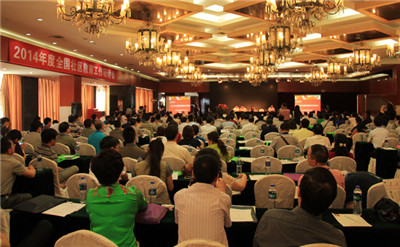 The 2014 National Community Education Workshop was convened in Taiyuan, Shanxi Province, on May 28th. Its main content included exploring the teaching methods and working mechanism of community education, arranging work related to the “satisfaction survey on community education of the Ministry of Education (MOE)”, and discussing the construction of the Community Education Experimental Centre (Base) of the Open University of China (OUC).
The 2014 National Community Education Workshop was convened in Taiyuan, Shanxi Province, on May 28th. Its main content included exploring the teaching methods and working mechanism of community education, arranging work related to the “satisfaction survey on community education of the Ministry of Education (MOE)”, and discussing the construction of the Community Education Experimental Centre (Base) of the Open University of China (OUC).
More than 260 representatives involved in community education from the national community education demonstration zones and experimental zones, national administrative departments for education, national open university system, and others from related disciplines nationwide took part in this workshop.

Huang Hui, Director of the Training Division for Adult Education of the Department of Vocational and Adult Education of the MOE, Zhang Shaogang, Vice Chairman of China Adult Education Association, Vice President of the OUC and Director of the MOE Research & Training Centre for Community Education (hereinafter “Centre” for short), Zhang Yaobing, President of Shanxi Radio and TV University(RTVU), Ma Zhaoxing, Director-General of Taiyuan Municipal Bureau of Education, Li Kang, Director of Private Education and Adult Education Division of Taiyuan Municipal Bureau of Education, and Shi Naimin, President of Taiyuan Community University (Taiyuan RTVU) attended the meeting.
Huang Hui delivered a speech wherein she brought out that the MOE started to set up national experimental zones and demonstration zones for community education in 2001, and thus took the lead in the development of national community education. To date, 181 state-level experimental zones and demonstration zones have been set up nationwide, and more than 500 such zones had been set up at the provincial level. However, district-level and county-level zones throughout the country made up only 15-20% of all zones and the community education coverage rate is low. The gap between the goal of constructing a learning society and actually implementing urban and rural community education construction was still very big. She emphasized the need to bring the discussion of community education development beyond the circle of education departments and to integrate community education into the civil affairs work of grassroots communities, to promote the establishment of a platform within the civil affairs departments that can propel the development of community education, and to advocate the use of resources and energy from social organizations to promote community education services.
Huang Hui explained her belief that further consideration of the situation and focus on the ultimate goals of community education is essential. The ultimate target of community education is all encompassing, including all members of society. The development objective of community education should be set up not only with a view constructing a system of lifelong learning for all and enhancing citizens’ quality of life, but also to further promote core social values and advance the construction of learning cities, serving the objectives put forward in the “18th Party Congress”. There are three areas that are currently receiving special focus: training new workers in urban construction skills, education and training among seniors, and specialized training in modern farming methods in rural areas. She emphasized that the Open Universities (RTVUs) should use their advantages to better serve community education. They can provide better service for community education by using their resource advantages. They need to make good use of their school-management experience and learning resources to enlarge the coverage of community education. They should strive for an integrated application of these resources, joining hands with regular universities, adult colleges, secondary and higher vocational colleges, adult technical and cultural schools, township technical and cultural schools, and social training agencies to provide better access to community education.
Concerning the future work of the Centre, Huang Hui said that the Centre should carry out its tasks and responsibilities in a positive way under the guidance of the Department of Vocational and Adult Education of the MOE. For the “satisfaction survey for national community education” which is coming up soon, Huang Hui required that it should be seen as a priority. She asked relative units to carefully implement it and work hard as per the spirit of the relevant documents of the MOE and the Centre.
Ma Zhaoxing expounded the starting point and basic methods of pushing forward community education by the Education Bureau of Taiyuan city. He said that the motivation for the government authorities to boost community education was to solve some elementary education dilemmas faced by community education, and to integrate the two areas so that they will exert a synergistic effect on each other. Additionally, the development of community education should help educators perceive the purpose and essence of education. To carry out community education and promote the development of productive citizens is a specific means to meet the goal of building a first-class provincial capital city set forth by the Taiyuan municipal government. He introduced in detail the specific practices and creative mechanisms for the development of community education by the Taiyuan municipal government. Taiyuan municipal government promulgated “The Legislation Regarding the Promotion of Lifelong Education in Taiyuan” in August of 2012, which was the first local regulation regarding lifelong education promulgated by provincial capital city. It laid the foundation for Taiyuan to realize the goal of becoming a learning society.
Zhang Shaogang expressed that with national reform becoming a more pressing goal, social management was also upgraded to social governance, which will need a three-dimensional space: the market, the government, and society, as a third party. On the topic of community education development, the government not only needs to exert a leading role, but also needs to introduce the market mechanism, with society acting as a third party in exploring the needs of community education. It’s necessary for governments to construct a network platform and give impetus for the masses to participate and to set relevant standards for management and supervision. The OUC has placed a high priority on the development of community education, taking full advantage of distance education, and increased support for resource development and platform construction. In combination with the work arrangement for the Centre by the MOE and the results of the OUC's promotion and launch of community education, Zhang Shaogang reviewed the work and achievements made since the Centre was set up three years ago, analyzing the existing problems, and outlining the framework of the action plans for community education in the coming three years. He pointed out that the Centre would continue its work based on the following goals: to construct evaluation criterion for community distance education; to create an online and offline learning mechanism, a learning resource sharing mechanism, and a win-win mechanism for multilateral participation; and to finish the "six big tasks", which were: to compile the annual “China Development Report in Community Education”, to continue research into the theory and practice of community education so as to provide consultation services, to promote experimental and demonstration projects, to form a curriculum system for community education utilizing i-tests and organizing colorful activities including teaching, experience, and competition exchanges, to construct a cooperation and exchange platform for sharing such resources as policies, information, and curricula, and to implement a learning outcome identification and evaluation process. Lastly, he explained that the Centre would start a community education "think tank" in order to provide community education research and consulting.
Zhou Yanjun, Deputy Director of the Centre reported on the work of the Centre in 2013 and the main thrust of the work in 2014. He said that in 2013 the Centre positively explored the community education teaching methods, many competitions were held during the opening ceremony of the ninth activity week of lifelong learning for all, the first batch of learning experience bases for community education were established to carry out research into online and offline interactive methods, and built relevant learning resources. At the same time, it carried out special research and training for the MOE. In 2014, it would carry out work in research, training, construction of experimental centres (bases), construction of resources, website promotion, and other such activities. He pointed out that the Centre would carry forward the exploration of innovation of teaching methods and enlarge the preparation for i-labs. The first batch of labs including i-3D printing labs, i-dress labs, i-tea labs, i-ecological garden labs, and i-martial arts labs have gone online, while the labs including i-tourism, i-red wine, and i-digital products were still under construction. It would further build up the curriculum resources around the i-labs curriculum system step by step. In the near future, it would launch such contests as the First 3D Printing’s Creative Design and Innovative Applications Competition, the first “I Love Vegetable Gardens” contest, the first national “Showcasing the China Dream” community clothing exhibition, the first national design competition of village entrepreneurship programmes, the second “Tea Art Cup” creative design competition for tea sets, the second calligraphy and seal cutting exhibition for harmonious communities, the second financing competition for community residents, and the second Chinese beautiful community painting contest, thus continuing to attract community residents to participate in community education through such activities, and constructing a platform for residents to create, exercise, and exchange opinions. The Centre organized to compile and publish “The Development Report on the Community Education of China (2012 )” and “Excellent Thesis Collection about Community Education”, and continued to promote its progress. In order to better study the effect of community education on the construction of the lifelong education system, and the effect of how distance education served lifelong learning for all, so as to carry out the exploration of teaching methods, resource construction and sharing methods in community education, and to advance the research on the theories and practice of community education positively and actively, the OUC approved the establishment of the first experimental centres (bases) of community education, and will soon start the approval of the second wave of experimental centres.
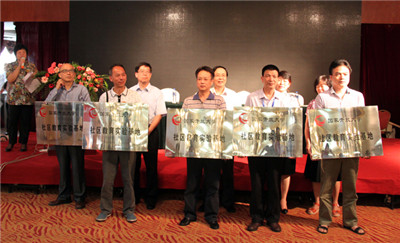
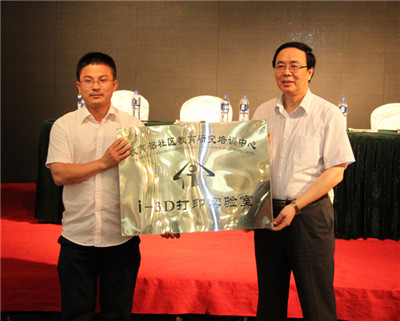
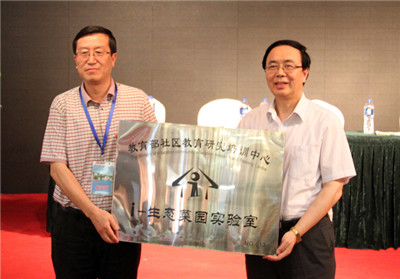
The meeting also provided explanation and training on the progress of and requirements for the “satisfaction survey about community education” of the MOE. The local centres were required to proactively implement the work requirements and strategies. The award ceremony for the first national RTVU’s Experimental Centre (Base) of Community Education and the newly-built i-labs for community education was also held at the meeting, as was the awards ceremony for winning entities and individuals in 2013’s community music activity show and excellent community education thesis. The China community education study network, www.shequ.edu.cn , was also opened at the meeting.
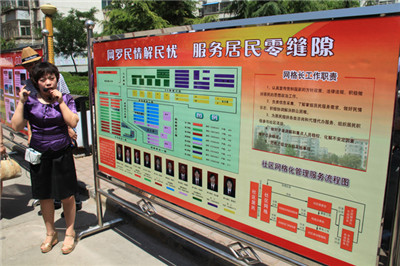
During the meeting, the representatives made a site visit to the Jingxiuyuan Community in the Xinghualing District of Taiyuan, discussing how to better develop community education and be creative in community education methods.
This meeting was very important to the OUC and the MOE Research & Training Centre for Community Education in implementing the spirit of “perfecting a lifelong education system and constructing a learning society”, put forward in the 18th Party Congress, and in further exploring the role of education services in the construction of a harmonious society. In the future, the Centre will continue to carry out research on community education, exerting its leading role and strength to speed up the development of community education in urban and rural areas.
By Li Huiqin, the MOE Research & Training Centre for Community Education